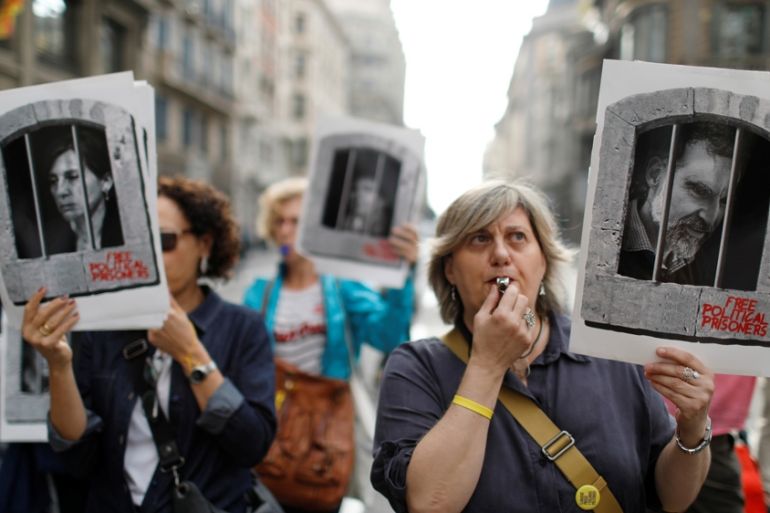Catalan separatist leaders handed jail terms for independence bid
Spain’s Supreme Court sentences nine, including former Catalonian vice president Oriol Junqueras, over independence bid.

Protesters have hit the streets in north-eastern Spain after the country’s Supreme Court on Monday sentenced nine of the 12 accused Catalan separatist leaders to between nine and 13 years in prison.
The 12 were accused of sedition over their roles in the region’s 2017 failed bid for independence.
Protesters blocked five regional roads across Catalonia, officials at the Catalan road traffic agency said on Monday.
Several streets in Barcelona were also blocked by protests, including parts of Diagonal avenue, which crosses the whole city, local police said. There were also protests in several big Catalan municipalities, such as Girona and Lleida.
Train tracks were briefly blocked outside Girona, a separatist stronghold, rail operator Rodalies said on Twitter.
The independence leaders’ sentences were lower than demanded by the prosecution – which had sought up to 25 years behind bars for former Catalan Vice President Oriol Junqueras.
| Who are the 12 Catalan separatist leaders? | |
|
Catalan vice president: 13 years Parliament speaker: 11.5 years Grassroots leaders: Nine years Regional ministers: 10.5 – 12 years Three others: 60,000-euro fine AFP |
“The Supreme Court has condemned Oriel Junqueras to 13 years of prison… on grounds of sedition and the misuse of public funds,” the ruling said.
The three other defendants in the landmark ruling were found guilty only of disobedience and not sentenced to prison. All defendants were acquitted of the most severe charge, rebellion.
The separatists were charged for their role in organising a referendum on the secession of the northeastern region of Catalonia from the Spanish state in October 2017.
‘Atrocity’
The former head of Catalonia’s regional government Carles Puigdemont reacted sharply to the verdict, terming it an “atrocity”.
“It is time to react … for the future of our sons and daughters. For democracy. For Europe. For Catalonia,” he wrote on Twitter.
Puigdemont was the head of the Spanish region at the time of the independence bid but was not part of this trial because he fled to Belgium, where he now lives in self-imposed exile.
Al Jazeera’s Sonia Gallego, reporting from the Spanish city of Barcelona, said: “The significance of this verdict is that it doesn’t carry the full weight of that more serious charge of rebellion.
“That was apparently what one of the prosecutors was actually calling for,” she added.
However, Gallego said that it was still a “hefty” sentence.
All nine sentenced were banned from running or participating in public office – as well as the other three defendants who will face a nominal ban for 10 months, she reported.
“This is likely to cause a lot of anger among the pro-secessionists here [in Catalonia].”
Worst political crisis in years
The government and the Spanish opposition, however, have welcomed the court’s decision.
“The sentence must be carried out and complied with,” Jose Luis Abalos, the acting public works minister told public broadcaster TVE.
“In Catalonia, there is a need for clear and responsible leadership on behalf of separatists.”
The leader of the opposition People’s Party said that Prime Minister Pedro Sanchez must affirm that he “will not pardon those convicted” and that he would on the side of the government “preserve public order and to avoid violent attitudes in the streets”.
The separatist leaders’ failed attempt to secede from the European nation had sparked the worst political crisis in decades.
Junqueras’ left-wing ERC party has said dialogue would not be possible without an “amnesty” for “political prisoners and those in exile”.
Barcelona Football Club also tweeted its own response to the ruling, saying: “Prison is not the solution.
“The resolution of the conflict in Catalonia must come exclusively from political dialogue.”
The separatist movement is hoping the guilty verdicts will unite their divided ranks and bring supporters onto the streets.
“It is time to rise up against the authoritarian fascism of the Spanish state and its accomplices,” tweeted the radical CDR, whose activists briefly blocked Barcelona’s Sants station on Sunday and cut traffic on one of its main streets. “It is time for the #PopularRevolt.”
“Democratic Tsunami”, a newly formed group set up to coordinate the response, called on demonstrators to meet in Barcelona’s Plaza Cataluna on Monday afternoon, while the Catalan National Assembly (ANC) and Omnium Cultural, the region’s two biggest grassroots pro-independence groups, have called an evening rally.
In coming days, demonstrators will march from five towns towards Barcelona where they will congregate on Friday, when a general strike has been called.
Spanish authorities have deployed hundreds of extra police to the region in anticipation of the ruling.
With this verdict, the government will be hoping to turn the page on the crisis and resume dialogue with the wealthy northeastern region where support for independence has been gaining momentum over the past decade, though it is unlikely to quell desires or dim the popularity of the movement’s leaders.